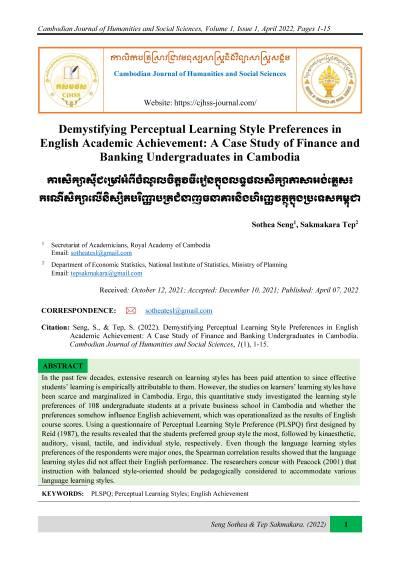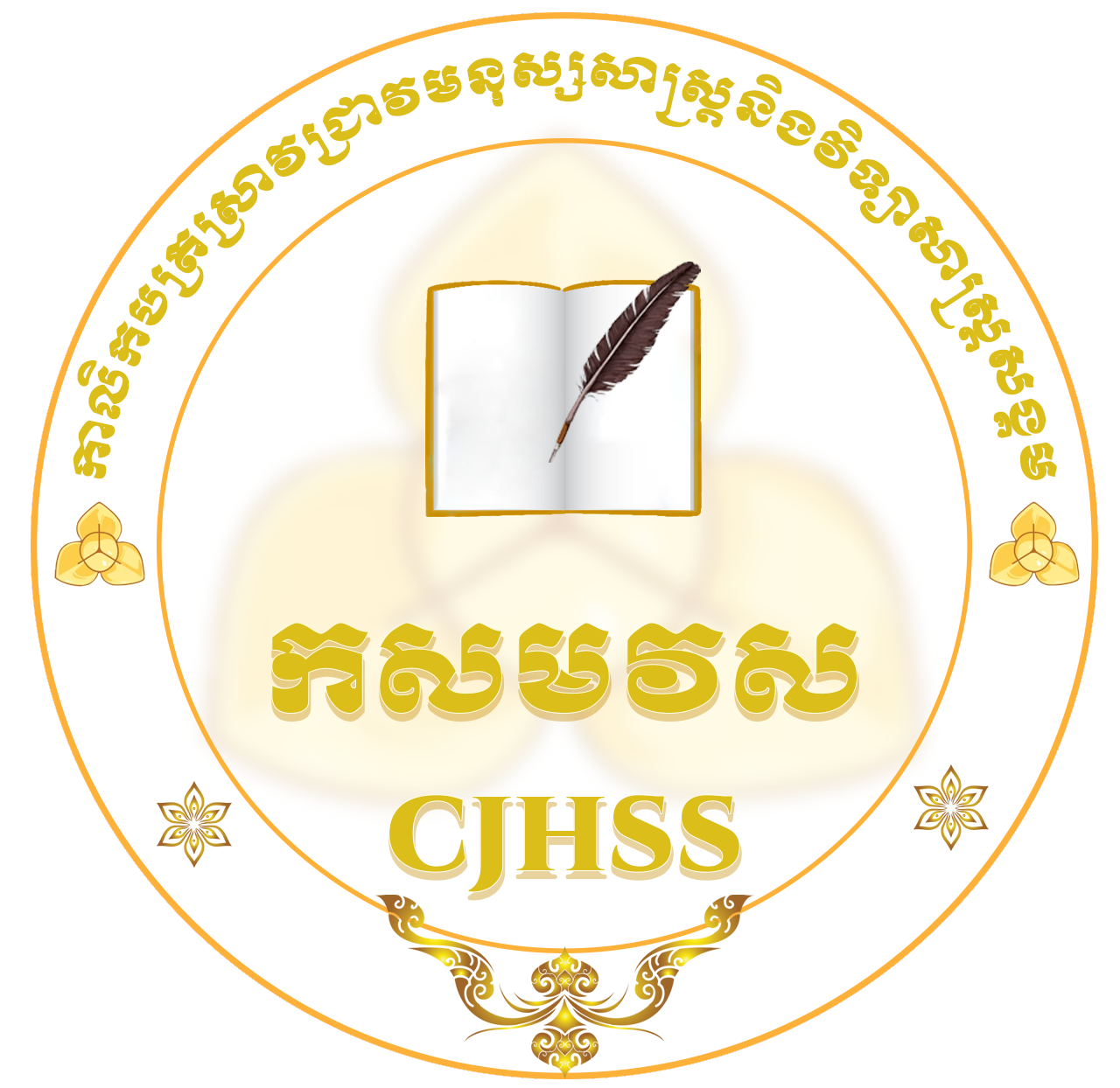Citation
Seng, S., & Tep, S. (2022). Demystifying Perceptual Learning Style Preferences in English Academic Achievement: A Case Study of Finance and Banking Undergraduates in Cambodia. Cambodian Journal of Humanities and Social Sciences, 1(1), 1-15.
អាគតដ្ឋាន
សេង សុធា និង ទេព ស័កមករា. (២០២២). ការសិក្សាស៊ីជម្រៅអំពីចំណូលចិត្តវិធីរៀនក្នុងលទ្ធផលសិក្សាភាសាអង់គ្លេស៖ ករណីសិក្សាលើនិស្សិតបរិញ្ញាបត្រជំនាញធនាគារនិងហិរញ្ញវត្ថុក្នុងប្រទេសកម្ពុជា. កាលិកបត្រស្រាវជ្រាវមនុស្សសាស្រ្តនិងវិទ្យាសាស្រ្តសង្គម, ១(១), ១-១៥.
Abstract
In the past few decades, extensive research on learning styles has been paid attention to since effective students’ learning is empirically attributable to them. However, the studies on learners’ learning styles have been scarce and marginalized in Cambodia. Ergo, this quantitative study investigated the learning style preferences of 108 undergraduate students at a private business school in Cambodia and whether the preferences somehow influence English achievement, which was operationalized as the results of English course scores. Using a questionnaire of Perceptual Learning Style Preference (PLSPQ) first designed by Reid (1987), the results revealed that the students preferred group style the most, followed by kinaesthetic, auditory, visual, tactile, and individual style, respectively. Even though the language learning styles preferences of the respondents were major ones, the Spearman correlation results showed that the language learning styles did not affect their English performance. The researchers concur with Peacock (2001) that instruction with balanced style-oriented should be pedagogically considered to accommodate various language learning styles.
សង្ខិតន័យ
ក្នុងរយៈពេលប៉ុន្មានទសវត្សចុងក្រោយនេះ ការសិក្សាស្រាវជ្រាវយ៉ាងទូលំទូលាយលើរបៀបរៀនសូត្រ (Learning Styles) ត្រូវបានគេយកចិត្តទុកដាក់ដោយសារវាគឺជាមូលហេតុបណ្តាលឱ្យការរៀនសូត្ររបស់សិស្សមានភាពជោគជ័យ។ យ៉ាងណាមិញការសិក្សាអំពីរបៀបរៀនសូត្រផ្សេងៗរបស់សិស្សនៅប្រទេសកម្ពុជានៅខ្វះខាត នឹងមិនត្រូវបានយកចិត្តទុកដាក់នៅឡើយ។ ដូច្នេះការសិក្សាបែបបរិមាណវិស័យនេះសង្កេតស្វែងរកចំណង់ចំណូលចិត្តរបៀបសិក្សារបស់សិស្សកម្រិតបរិញ្ញាបត្រចំនួន១០៨នាក់នៅសាលាពាណិជ្ជកម្មឯកជនមួយនៅកម្ពុជា នឹងថាតើចំណង់ចំណូលចិត្តនេះមានឥទ្ធិពលយ៉ាងណាលើលទ្ធផលសិក្សាភាសាអង់គ្លេសរបស់ពួកគេដោយផ្អែកលើលទ្ធផលពិន្ទុនៃមុខវិជ្ជាសិក្សាភាសាអង់គ្លេស។ ការស្រាវជ្រាវនេះបានផ្អែកលើកម្រងសំណួរនៃចំណង់ចំណូលចិត្តពីរបៀបរៀនសូត្របែបការយល់ឃើញ (PLSPQ) ដែលបង្កើតដំបូងដោយលោក Reid (១៩៨៧)នឹងបានបង្ហាញលទ្ធផលថាប្រភេទចំណង់ចំណូលចិត្តនៃរបៀបរៀនមានកម្រិតខ្ពស់ជាងគេគឺរបៀបរៀនជាក្រុម (Group Style) និងជាបន្តបន្ទាប់គ្នាដោយរបៀបរៀនបែបសរីរាង្គ (Kinaesthetic Style) ស្តាប់ (Auditory Style) មើលឃើញ (Visual Style) ប៉ះពាល់ (Tactile Style) និងបុគ្គល (Individual Style)។ ទោះបីជាចំណង់ចំណូលចិត្តរបៀបរៀនភាសារបស់សំណាកគម្រូត្រូវបានរកឃើញនៅកម្រិតខ្ពស់ក៏លទ្ធផលនៃការសិក្សាស្វែងរកទំនាក់ទំនងរបស់ Spearman បានបង្ហាញថារបៀបរៀនភាសាមិនបានជះឥទ្ធិពលលើលទ្ធផលភាសាអង់គ្លេសរបស់ពួកគេទេ។ អ្នកស្រាវជ្រាវយល់ស្របជាមួយលោក Peacock (២០០១) ដែលធ្លាប់បានណែនាំពីការបង្រៀនផ្តោតលើតុល្យភាពនៃរបៀបរៀនសូត្ររបស់សិស្សគួរតែត្រូវបានយកមកពិចារណាដើម្បីជួយសម្រួលរបៀបរៀនភាសាផ្សេងៗ។


